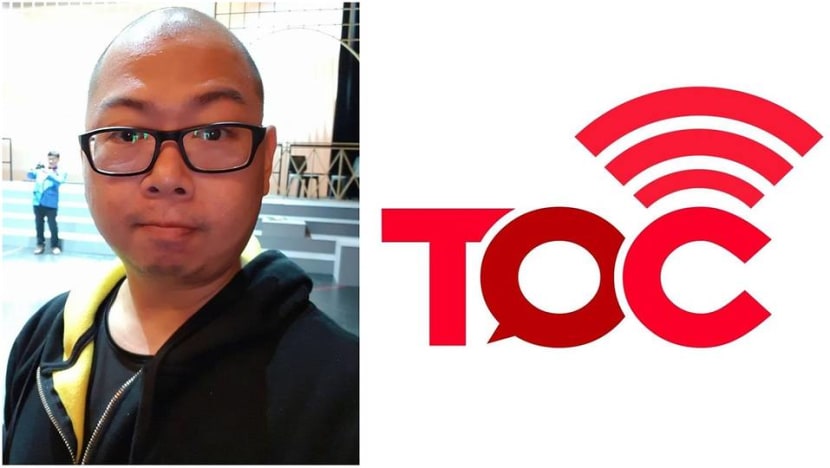Judgment reserved in TOC's POFMA challenge, arguments on whether falsehoods can be republished

Chief editor of The Online Citizen (TOC), Terry Xu. (Photos: Facebook/TheOnlineCitizen/Terry Xu)
SINGAPORE: Judgment was reserved on Thursday (Feb 6) in The Online Citizen's (TOC) appeal against a correction direction under the Protection from Online Falsehoods and Manipulation Act (POFMA).
The alternative news site had been issued the direction by Home Affairs Minister K Shanmugam for an article where a Malaysian human rights group alleged "brutal, unlawful" executions in Changi Prison.
Submissions from the Attorney-General's Chambers (AGC) state that TOC "does not dispute the falsity of the falsehoods that it had republished".
Instead, its contention is that it should be allowed to freely disseminate the falsehood with immunity from POFMA because it was a mere republication without stating that it believed the allegations to be true.
READ: Malaysian rights group ‘absolutely stands by' claims on Changi prison execution methods, will not comply with correction direction
The article, "M'sian human rights group alleges 'brutal, unlawful' state execution process in Changi Prison", was published on Jan 16 this year.
It described allegations of brutal hanging procedures, including the kicking of a prisoner's neck "with great force in order to break it".
MHA refuted the allegations as "untrue, baseless and preposterous", and said any acts as those described would have been thoroughly investigated and dealt with.
The affidavit of TOC editor Terry Xu Yuanchen stated that the site was "simply reporting the fact that the allegations ... were made by Lawyers for Liberty".
He also wrote that he had "never made any averment to the truth of the (statement)", and is "not responsible for the making of the statements".
TOC argued that since it is true that Lawyers for Liberty (LFL) did make the allegations, the statement when viewed in context "is true".
However, AGC said this was "no defence".
Mr Xu wrote in his written submissions that a reasonable reader would recognise that the article was reporting on hearsay.
He said the words allege or allegation were used six times in the article, ensuring that readers were aware that they were unverified allegations.
The article also concluded with a sentence stating that TOC had contacted MHA for comments, signalling to readers that TOC was trying to verify the allegations with the ministry.
READ: Shanmugam rejects TOC’s application to cancel correction direction for article on execution methods
TOC FURTHER SPREAD FALSEHOOD IN ITS ARTICLE: AGC
Its representatives Hui Choon Kuen, Jamie Pang and Jocelyn Teo wrote in their submissions that TOC had "further spread the falsehood to the Singapore public" by reporting on and reproducing the statement in its article.
"The fact that (the) statement was attributed to LFL and not presented as a statement TOC itself was making, makes little difference to the impact of falsehoods described above," they said.
TOC had repeated the falsehoods wholesale without rejecting them, said AGC, and it does not have to be the originator, creator or maker of the statement to be subject to POFMA.
AGC also said that TOC's appeal was "motivated by a misunderstanding" that anyone, whether an individual or journalist, who is issued a correction direction is held responsible for making the false statement and must seek vindication in the courts.
This "is completely unfounded", said AGC, adding that a correction direction is "aimed at protecting the public and public interest" from falsehoods and not attributing responsibility for the making of falsehoods to the author of the article.
Responding to TOC's concern that issuing a correction direction in such cases would have an impact on "what court reporters and investigative journalists do", AGC noted that such a direction does not require the article to be taken down, but merely requires the publishing of a correction notice.
AGC referred to the case of Ting Choon Meng, saying "there is no public interest in the spread of falsehoods, whether by the new media, the mainstream media, or otherwise".
"A journalist who disagrees that he or she has communicated any (falsehoods) in his or her article is free to come to court and challenge the minister’s assessment that his or her article had done so," it said.
The case was heard in chambers before Justice Belinda Ang, a day after another judge dismissed the first POFMA challenge by the Singapore Democratic Party (SDP).
BURDEN OF PROOF IS NOT ON MINISTER: AGC
In their arguments, AGC's representatives said the judge's finding in the SDP case that the burden of proof is on the minister to prove that statements are false is incorrect.
The judge had found that Parliament could not have intended for the burden of proof to fall on those appealing against correction directions under POFMA.
"With all due respect, it is contended in the strongest possible terms that it is in fact the opposite – Parliament could not have intended for the burden of proof to fall on the minister," said AGC.
"This is because such a framework would allow any person to make up all sorts of falsehoods on sensitive matters without any basis and thereby potentially compel the Government to disclose such sensitive information as it has the burden to disprove the falsehoods."
In this case, if the burden of proof fell on the Singapore Prison Service, "it may end up having to disclose its security procedures to discharge its burden", said AGC.
"Parliament could not have intended that any person could potentially compel the Government to disclose sensitive information with the following simple stratagem," it said.
Mr Xu told CNA after the hearing that the process of filing the POFMA appeal was "easy as a self-represented appellant" because of the assistance from the High Court.
"Nevertheless the sheer effort and unfamiliarity would deter any reasonable member of public from contesting a direction issued by a minister," he said.
The judge will release her verdict at a later date. The findings for SDP's case had been released three weeks after the hearings.














